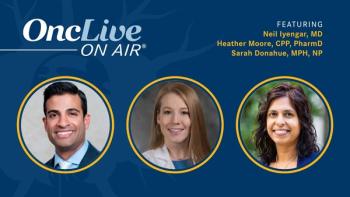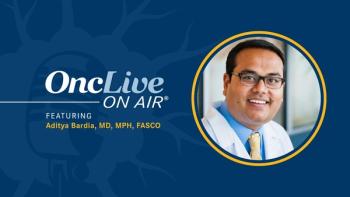
Dr Sikov on the Benefit of CDK4/6 Inhibitors in HR+/HER2-Negative Breast Cancer
William M. Sikov, MD, discusses the benefit of CDK4/6 inhibitors in the treatment of hormone receptor–positive/HER2-negative breast cancers.
William M. Sikov, MD, medical oncologist, Women and Infants Hospital of Rhode Island, member, Lifespan Educational Advisory Committee, Lifespan Cancer Institute, discusses the benefit of CDK4/6 inhibitors in the treatment of hormone receptor (HR)–positive/HER2-negative breast cancers.
Hormones, such as estrogen, stimulate the growth of HR-positive/HER2-negative breast cancer, and these hormones activate genes that lead to increased cell proliferation, Sikov explains. Cyclin D1 is a consistent hallmark of cell proliferation, working with the CDK4/6 to phosphorylate the retinoblastoma (Rb) protein, leading to the release of the E2F transcription factor, which aids in the ability of cancer cells to continue to grow and divide, Sikov notes.
Treatment with endocrine therapy causes cyclin D1 levels to fall when patients; however, if patient still develop to an endocrine therapy, cyclin D1 levels will rise, leading to cancer cells to growing and dividing. This is where CDK4/6 inhibitors can be beneficial, Sikov says. By binding to CDK4/6, these inhibitors prevent the uptake of cyclin D1 and the phosphorylation of Rb protein. When the Rb protein is not phosphorylated, it will bind to E2F and prevent the cell from going through a cell cycle, Sikov expands.
This mechanism of action of CDK4/6 inhibitors has been shown to enhance and extend the effectiveness of anti-hormone therapies to potentially delay the development of resistance to endocrine therapy, Sikov explains. The use of these agents in the HR-positive/HER2-negative breast cancer space has led to improvements in progression-free survival, and in some settings, improvements in overall survival, Sikov adds. By delaying the onset of resistance to endocrine therapy, CDK4/6 inhibitors can also delay the need for patients to switch from endocrine therapy to a more toxic treatments, such as chemotherapy, Sikov concludes.



































